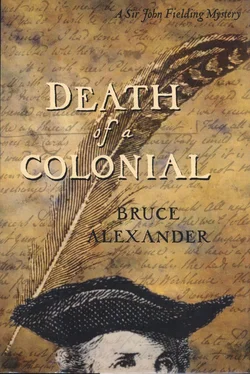Bruce Alexander - Death of a Colonial
Здесь есть возможность читать онлайн «Bruce Alexander - Death of a Colonial» весь текст электронной книги совершенно бесплатно (целиком полную версию без сокращений). В некоторых случаях можно слушать аудио, скачать через торрент в формате fb2 и присутствует краткое содержание. Год выпуска: 1999, ISBN: 1999, Издательство: Putnam Adult, Жанр: Исторический детектив, на английском языке. Описание произведения, (предисловие) а так же отзывы посетителей доступны на портале библиотеки ЛибКат.
- Название:Death of a Colonial
- Автор:
- Издательство:Putnam Adult
- Жанр:
- Год:1999
- ISBN:9780425177020
- Рейтинг книги:3 / 5. Голосов: 1
-
Избранное:Добавить в избранное
- Отзывы:
-
Ваша оценка:
- 60
- 1
- 2
- 3
- 4
- 5
Death of a Colonial: краткое содержание, описание и аннотация
Предлагаем к чтению аннотацию, описание, краткое содержание или предисловие (зависит от того, что написал сам автор книги «Death of a Colonial»). Если вы не нашли необходимую информацию о книге — напишите в комментариях, мы постараемся отыскать её.
Death of a Colonial — читать онлайн бесплатно полную книгу (весь текст) целиком
Ниже представлен текст книги, разбитый по страницам. Система сохранения места последней прочитанной страницы, позволяет с удобством читать онлайн бесплатно книгу «Death of a Colonial», без необходимости каждый раз заново искать на чём Вы остановились. Поставьте закладку, и сможете в любой момент перейти на страницу, на которой закончили чтение.
Интервал:
Закладка:
“We struck south upon reaching the river, the six of us marching along its margin as Mr. Bolt and Sa-Ku-Nah searched ahead for the ford which seemed always to be just ahead. It was found twelve miles SSW today. Tomorrow we shall attempt the river-crossing. I, who had always prided myself on my strength and vigor while in school and at Oxford, find myself taxed each new day by the pace set by my companions over this rough, beautiful country. Yet each morning I rise, rested and ready to meet the challenge once more. I doubt that any of my fellows at Balliol could match me in this.”
“In my continuing attempt to survey the flora and fauna of these parts, I present on this page a drawing from memory of a bird said to be right common hereabouts — a red-headed woodpecker. While the woodpecker is common enough in England, and well known for its ability to bore holes in trees, we have not one with this coloration. Here it is called a ‘sapsucker’.”
That entry from Lawrence Paltrow’s ‘ Journal of Exploration and Discovery ’, which was dated May 11, 1763, was not yet the last in the book. There were a good many additional entries, each filling a page or more. And each represented a day gone by on this mysterious expedition into the backlands of the colony of Virginia — and beyond. Not that there were formal and absolute boundaries in this primitive frontier region (for there were no towns, settlements, or even freeholds to be seen along the way once passage had been made through the Cumberland Gap); nevertheless, he was given to know that at some point in their journey they had passed out of Virginia and into what was known as Kin-Tuh-Kee. By the sound of it, the name clearly had its origin in one of the numberless tongues of the North American Indians. What the word — or words — meant I have no idea, yet in my reading of life in the North American colonies, I had come across reference to it a number of times; so it was that I knew it to be a wild region, one filled with ferocious and dangerous animals, as well as Indians capable of the most ferocious behavior.
Though Lawrence Paltrow gave no firm indication of the purpose of their journey, I found that with the aid of a detailed map of the Virginia colony and its surroundings which I purchased at Bricker s, the cartographer in Grub Street, I was able to follow what Paltrow called their “trail” with fair accuracy quite some distance. It was clear that they had made a long journey southward. Was it truly a journey of exploration? No, the title of Paltrow’s Journal notwithstanding, Eli Bolt was not the man to lead a map-making expedition: His sort would do what he could to keep those back trails secret; he carried his map within his head. But a journey of discovery? Now, that was another matter, was it not? The question was, however, what was it they sought to discover? They must be there in search of something.
If we knew what that something might be, I would better understand what Lawrence Paltrow was doing in such strange company; and conversely, if we knew what his role had been on this expedition, we might then know its purpose. I could but wonder at such questions as these.
“May 12,1763.”
“On this day we made a ford of the Cumberland River. It was not accomplished without great effort nor without loss. I, who had no experience in such fearsome maneuvers, had little notion of what lay in store — yet that was perhaps just as well. Had I known, I might well have fled at full speed back the way we had come.”
“The fundamental reason for the extreme difficulties at which I have hinted was no more than a simple consequence of nature, to wit: Heavy spring rains that year had lasted late into April. As a result, the river had reached its flood crest only a week or ten days before, and was higher by at least a foot on this day than when Mr. Bolt had made his crossing at approximately the same time the year before. Two of his own men, Coley and the unfortunate Miles, balked and protested the plan, saying that the water ran too high and the current too swift to undertake the fords at this point. When Mr. Bolt asked in his rough way what they proposed, they responded in chorus that it was only sensible to wait until the river be down to a safe level. Their leader said nothing in immediate response to them, but turned away and put the matter briefly to Sa-Ku-Nah. (At least one assumes that was what they discussed, yet for all I knew of the latter’s guttural talk, they might just as well have been conversing upon the price of tea in Williamsburg.) The aborigine let forth a proper laugh in reply, then stepped out into the river to show them they had nothing to fear; I noted, however, that he did not step far out into the river. In any case, Mr. Bolt allowed no more discussion of the matter, but set the party to work building the raft upon which we would transport packs, rifles, powder and shot, tools, and my instruments. Since trees had been cut the evening before, they had only to be sectioned and lashed together to make a raft, which to all appearances might be used again when we made our return.”
“Thus by mid-morn were we ready to make our assault upon the river. Near naked, pushing the raft before us, we ventured cautiously into the water. We soon felt the pull of the current, but could do no more than keep a grasp on the lashings and hope for the best. Alas, the best was not to be! We were not even halfway across — no more than up to our waists in those chill mountain waters — when we were quite suddenly hit by the full force of the current. I held tightly to the braided leather; others could not. I found myself lifted from my feet. The raft began to whirl in the current, taking me with it. It knocked one of our number down, which of them I could not tell, so busy was I trying to plant my feet firmly upon the river bottom. Then was I grabbed by the shoulder by one who proved to be Mr. Bolt. He alone, it seemed, with his remarkable strength, managed to halt the whirligigging of the raft by grasping the lashings with one hand and me with the other; as long as I held on as tight as he, he had control of the situation. So was I able then to find the river bottom with my feet. Mr. Bolt ordered us all back to the shore whence we had come. As we hauled and heaved, I glanced round the raft and saw that one of our number was gone. The missing man was Timothy Miles; it must have been Miles, I realized, who was knocked down when the raft went out of control. He and Coley had insisted the crossing was unsafe — and so it had proved to be. The proof, however, was in the loss of Miles himself. I had seen him knocked down, perhaps knocked unconscious; he disappeared beneath the water’s surface, never to rise again in my sight; indeed, he might by then be half a mile downstream and most certainly drowned.”
“Mr. Bolt made no mention of that. Indeed, he had very little to say. With the help of Sa-Ku-Nah, he fixed hemp rope to the leather lashings of the raft. The two conferred briefly, then he announced that they would let the rope play out across the width of the river. We were to follow with the raft after they had made it across, and only upon their signal.”
“So it went. Mir. Bolt and Sa-Ku-Nah, more experienced than the rest of us, made it to the far riverbank without mishap. Yet, as we watched, we noted that the river, at its deepest, covered Mir. Bolt up to his shoulders and Sa-Ku-Nah all the way to his neck. They wound the rope around a birch tree of a reasonable thickness, then signaled us to push the raft into the water and follow them across. Thus, we were in this way able to march along behind the raft, holding it steady and on a straight course. At the deepest part of the ford, young Coley, who was quite the shortest of us, found it necessary to float behind, mouth and nose raised out of the water, that he might not drown.”
Читать дальшеИнтервал:
Закладка:
Похожие книги на «Death of a Colonial»
Представляем Вашему вниманию похожие книги на «Death of a Colonial» списком для выбора. Мы отобрали схожую по названию и смыслу литературу в надежде предоставить читателям больше вариантов отыскать новые, интересные, ещё непрочитанные произведения.
Обсуждение, отзывы о книге «Death of a Colonial» и просто собственные мнения читателей. Оставьте ваши комментарии, напишите, что Вы думаете о произведении, его смысле или главных героях. Укажите что конкретно понравилось, а что нет, и почему Вы так считаете.












